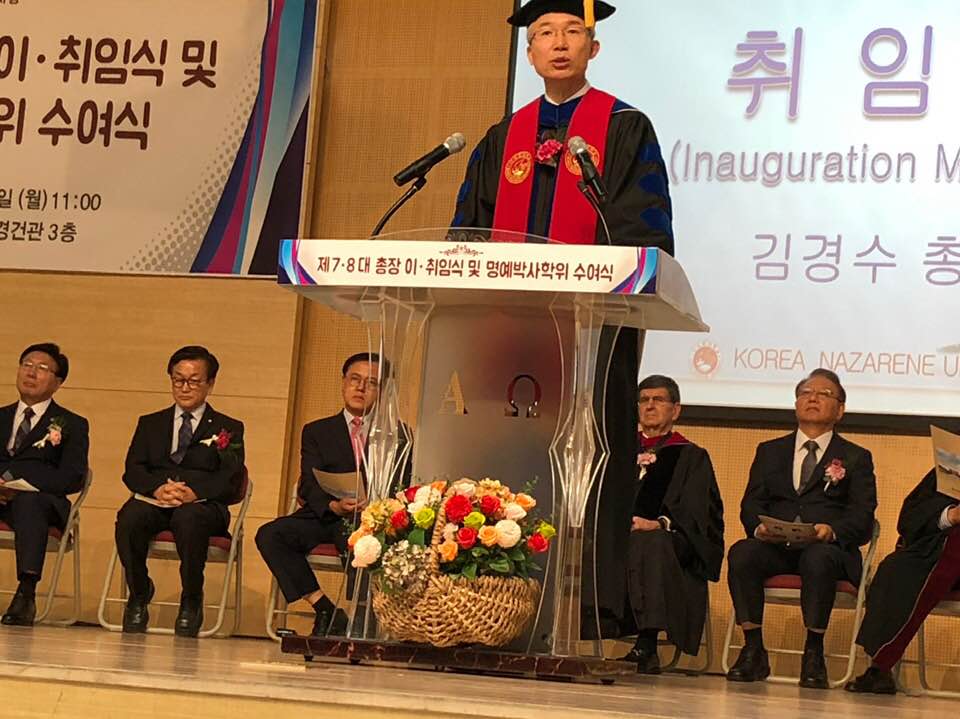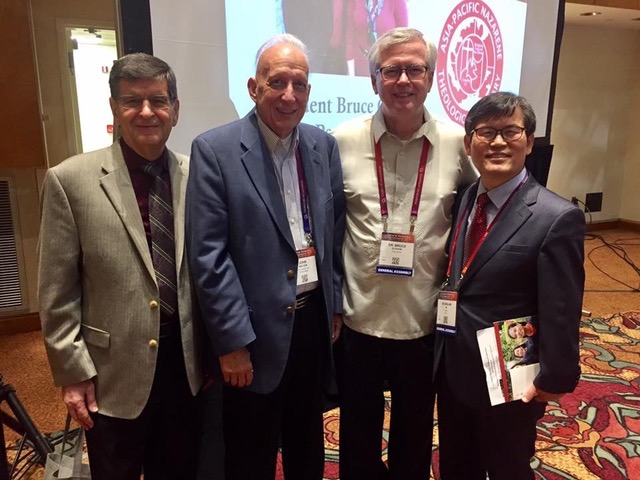
The edited address below was given on September 9, 2019 at the Korea Nazarene University on the occasion of the inauguration service and ceremony of Dr. David Kyungsoo Kim as the new KNU president.
I remember sitting in a coffee shop on a Saturday evening in Manila, Philippines. I was enjoying a relaxing evening with two students from the Asia Pacific Nazarene Theological Seminary.
The conversation turned serious. One of the students stated passionately, “Caring for others is the measure of greatness.” Not brilliance in the classroom, money in the bank, status nor position. But, “caring for others… is the measure of greatness.”
I’ve been thinking about the discussion in Manila with these students. What does “caring for others” look like on the Korea Nazarene University campus? In the midst of everyday conflicts and colliding expectations where we work and lead?
I read of a former pro basketball star I admired. Speaking of his university basketball coach, he said, “My development as a PERSON was as important to him as my development as a PLAYER.”
What a compliment to a coach, and also to faculty members and the university president! When our priority concern is persons to be developed and not “objects” to be manipulated. It is greatness, indeed, when we focus more on the people around us than on our power or position.
Three questions have captivated me during my years in Christian higher education leadership:
Question #1. How can we work together as an academic community of faith in such a way that our relationships are redemptive and a witness to unbelievers of the reconciling work of God in Christ?
Question #2. If, “in Christ, all things are made new,” then how does our relationship with Christ transform the way we lead a Christian university?
Question #3. In conflict situations, especially when seemingly irreconcilable expectations are placed on the university president, how can we lead in these situations, really lead, with “the mind of Christ”?
These are leadership questions! Our responses to them will determine our measure of greatness. When good and godly people differ and often collide with us over vision and values, great leaders choose to “care deeply.”
Jim Collins, in his book, Good to Great, talks about the critical characteristics of leaders. He speaks of humility and fierce resolve as essential for level 5 or great leaders.
Great Christian leaders also care deeply. They value people, not power. For these leaders, leadership begins in the heart, not the head.
More specifically, CARING LEADERS:
#1. Speak Gracefully. They watch the words they use. Words spoken can bless or “destroy” people.
According to Ephesians 4:25, God uses our words spoken to others within the Body of Christ to extend His grace through us to them. What a powerful and probing thought! Choose to “bless” people with your words.
#2. Live Gratefully. In the good days and the not so good days, choose to be grateful. (1 Thessalonians 5:18) Comparison with others, their gifts, their finances, their facilities, their students…can rob us of joy and peace. Don’t compare. Choose to embrace gratitude, appreciation and thankfulness for the people, place and circumstances God gives to you at KNU!
Caring Leaders speak gracefully and live gratefully.
They also: #3. Listen Intently. They seek first to understand. Understanding, not agreement is the key to conflict management.
Believe that good and godly people can have honest and intense differences. Yes. Good and godly people sometimes collide over vision and values. We convey value and worth to those who differ with us when we listen intently to them.
God can give us “eyes” to really see the people with whom we work and “ears” to really hear what they want and need to say to us.
#4. Forgive Freely. Caring leaders are proactive in extending forgiveness. A spirit of forgiveness transforms and empowers leaders.
Remember the words of Jesus on the Cross: “Father, forgive them; for they know not what they do” (Luke 23:34, KJV). Was Jesus naïve? No. Jesus was not going to permit what others said about Him or the evil they did against Him to create a bitterness or resentment within Him and thereby create a rupture in the relationship with God.
Caring Leaders speak gracefully, live gratefully, listen intently and forgive freely.
They also: #5. Lead Humbly. Great leaders lead with clear vision, deep humility and intense resolve.
The transference of vision defines caring leaders. Arrogance and intimidation do not characterize their behavior. Rather, they lead by mission, collaboration and compassion.
Caring leaders seek to balance the twin and sometimes conflicting responsibilities of long range planning with the daily management and interpersonal conflicts of the university. In the midst of this tension, they lead from their knees with much grace and deep humility.
Dr. Kim, be known as one who intentionally goes around doing good. Not just at home but here at Korea Nazarene University. Listen closely to students, staff and faculty, and to your Board of Trustees. Let your gentleness be known to all, particularly with those who differ with you over the university mission, vision, values and programs.
Leaders, like you and me, desire to be known as decisive and our decision-making marked by firmness. We believe that our actions must be characterized by certainty and conclusiveness.
However, even more critical in leading others is a distinctively Christian quality of communication and depth of relationships. Caring for others is the mark of greatness, more so than decisiveness.
Determine, with the enabling power of the Triune God, to make this care and concern for others – this listening and depth of communication and relationships – this gentleness and kindness – your measure of greatness!
May the peace of Christ be yours in abundance as you lead this great university!
LeBron Fairbanks
Education Commissioner, Church of the Nazarene, retired
Mount Vernon Nazarene University, president emeritus
Asia Pacific Nazarene Theological Seminary, president emeritus





